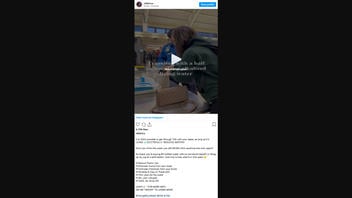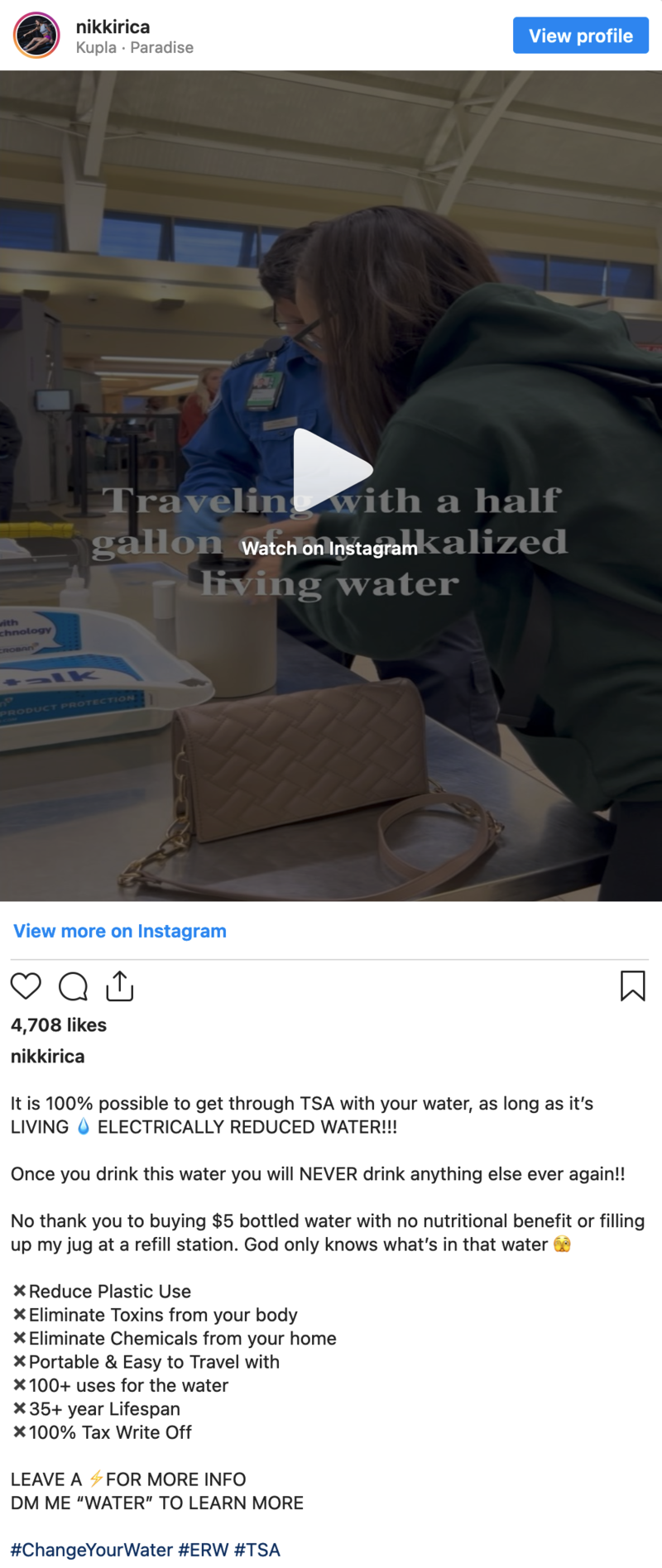
Is it always "possible to get through TSA with your water, as long as it's living electrically reduced water" or "medical grade water"? Not necessarily: A spokesperson for the Transportation Security Administration (TSA) told Lead Stories that even if a person identifies water at a checkpoint as medically necessary water and passes an explosives test, the transportation security officer (TSO) on the scene is the one who makes the final decision as to whether the liquid is allowed through the checkpoint. A gastroenterology expert told Lead Stories that distilled or sterilized water are examples of water-like liquids used in particular medical devices. A nutrition expert tells us there is not enough scientific evidence to back up any medicinal necessity for the consumption of electrolyzed reduced water.
The claim appeared in an Instagram post on July 7, 2022. The caption reads:
It is 100% possible to get through TSA with your water, as long as it's LIVING 💧 ELECTRICALLY REDUCED WATER!!!
Once you drink this water you will NEVER drink anything else ever again!!
No thank you to buying $5 bottled water with no nutritional benefit or filling up my jug at a refill station. God only knows what's in that water
This is what the post looked like on Instagram at the time of writing:

(Source: Facebook screenshot taken on Wed July 20 19:32:21 2022 UTC)
While the post makes several claims about "Living Electrically Reduced Water," this fact check will focus only on the claim regarding TSA regulations for liquids.
The post includes a brief video clip of a woman at what appears to be a TSA checkpoint in an airport. Text on screen says, "Traveling with a half gallon of my alkalized living water." As the agent examines a large thermos-like jug, text on screen says, "Medical Grade water or Electrically Reduced Water is allowed through TSA." The woman gives a thumbs-up signal when the agent appears to clear her to pass through. It's not clear what, if anything, is in the jug.
A Google search using the keywords "TSA Medical Grade Water" revealed this July 5, 2020, tweet from the @AskTSA Twitter account, which served as a response to a question posed by a social media user as to whether or not the TSA recognizes "medical grade water." It reads:
All types of water are good to go through the security checkpoint and must follow the liquids rule. It must be in containers that are 3.4 oz or less and fit comfortably in one quart-sized zip-top bag. One liquids bag is allowed per passenger through security.
In an email to Lead Stories on July 19, 2022, a New England region TSA spokesperson wrote that the claim in the post is conditional:
We stick by what we specifically have posted on our Disabilities and Medical conditions page. A passenger would need to identify that they have medically necessary water to a TSO. From there it's a case-by-case basis situation whether they test the water for explosives. Again, the final decision rests with the TSA officer on whether an item is allowed through the checkpoint.
Example: A TSO would not let a passenger bring a 16oz bottle of Dasani water through security just because they claimed it was medically necessary.
We would recommend that any quantity of medically necessary water over 3.4 oz. be placed in a passenger's checked bag.
Medical water is unofficially defined (by a business that produces it) as a key ingredient, raw material or solvent in the development, formulation and manufacturing of many pharmaceutical and biopharmaceutical products.
The TSA website implies that it includes liquid medication that can, for example, go in "IV bags, pumps, and syringes." However, they are also unclear about what is expressly declared a "medically necessary liquid" in their standards. They also have a gel ice packs page that states that they are considered medically necessary medications. Still, they must meet the 3-1-1 liquids rule if melted. They recently updated their traveling with children page to include breast milk, formula and breast milk pumping equipment as medically necessary liquids.
Underneath the sections on contact lenses, contact lens solution, EpiPens and inhalers on the "What Can I Bring" page on the TSA.gov website, it reads:
TSA allows larger amounts of medically necessary liquids, gels, and aerosols in reasonable quantities for your trip, but you must declare them to security officers at the checkpoint for inspection.
A similar warning is listed at the top of the "What Can I Bring" page that reads:
The final decision rests with the TSA officer on whether an item is allowed through the checkpoint.
Dr. Joseph Murray, a professor of medicine at Mayo Clinic who specializes in gastroenterology and hepatology, told Lead Stories in an email on July 19, 2022, that he has not heard of "medical water" as a prescribed treatment for any particular condition:
I have heard of people claiming ionized water has some health effects. And I have heard of distilled or sterilized water for things like drug dilution or for the humidifier of CPAP masks. It certainly is important to stay hydrated these hot days, especially while traveling, but the water available on flights is sufficient to ward off dehydration.
Lydia Hall, the media relations manager at the Academy of Nutrition and Dietetics, cited this study that found the daily ingestion of alkaline electrolyzed water beneficial to the human body.
Hall also relayed this message in an email to Lead Stories on July 20, 2022, from Amy Bragagnini, a registered dietitian nutritionist who specializes in nutrition for patients with cancer and also serves as a national spokesperson for the Academy of Nutrition and Dietetics. She told Lead Stories:
There does not appear to be enough scientific evidence to back up any medicinal necessity for the consumption of electrolyzed reduced water. Although I would not discourage these patients from drinking this particular type of water, I do not consider it medically necessary.

















